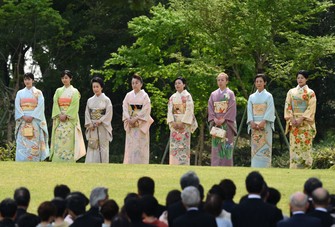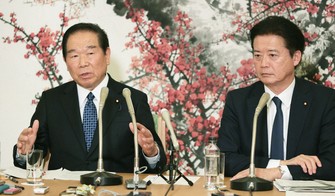
Imperial Household members are seen during a spring garden party at the Akasaka Imperial Gardens in Tokyo’s Minato Ward on April 22, 2025. (Pool photo)
TOKYO — Japanese legislators are considering letting the Imperial House Council decide on the status of husbands and children of female members of the Imperial Family who get married, the Mainichi Shimbun learned from sources close to the matter on April 25.
The proposal comes amid discussions aimed at ensuring stable imperial succession by maintaining Imperial Family numbers. While there remains a gap between the ruling Liberal Democratic Party (LDP) and the largest opposition Constitutional Democratic Party of Japan (CDP) as to whether the husbands and children of married female members should be allowed to enter the Imperial Family, an agreement on the proposal could open the door for Princess Aiko, the 23-year-old daughter of Emperor Naruhito and Empress Masako, and other female members to retain their Imperial Family status after marriage.
The Imperial House Law stipulates that female members who marry outside the Imperial Family lose their status as members of the family. Among the six unmarried members, five besides Prince Hisahito, 18, the eldest son of Crown Prince Akishino (Fumihito), are women, making a decline in the number of Imperial Family members inevitable if any of them marry.
House of Representatives Speaker Fukushiro Nukaga aims to consolidate opinions on the issue during the current session of the Diet. On April 17, he announced that a proposal from the speaker and vice speaker of the House of Representatives and the president and vice president of the House of Councillors would be presented at the next all-party meeting, and informal discussions had continued between the LDP and CDP.
On April 24, Nukaga met with officials including the LDP’s Supreme Advisor Taro Aso and CDP leader Yoshihiko Noda at the speaker’s official residence. During the meeting, Noda proposed that the Imperial House Council decide on the status of the husband and children of female members who marry at the time of their marriage, and Aso took the proposal back for consideration. The LDP’s response is expected to be a focal point.

House of Representatives Speaker Fukushiro Nukaga, left, and Vice Speaker Koichiro Gemba hold a news conference following a meeting to consider measures to maintain the number of Imperial Family members, at the speaker’s official residence in Tokyo on Jan. 31, 2025. (Mainichi/Tsutomu Kobayashi)
An interim report by the four upper and lower house officials last September noted that both the ruling and opposition parties had “achieved a generally shared understanding” that female Imperial Family members should retain their status after marriage.
However, the LDP, its junior coalition partner Komeito, Nippon Ishin (the Japan Innovation Party) and the Democratic Party for the People are backing a plan that would bar the husbands and children of those female members from entering the Imperial Family. Conservative members of the LDP are particularly wary that if a female member of the Imperial Family were to ascend the throne in the future, this could lead to the emergence of an “emperor from the maternal line” whose father has no link to the emperor’s lineage. In contrast, the CDP is calling for consideration of a proposal that would bring both the husband and children of married members into the Imperial Family.
Amid these diverging views, a compromise plan that would leave the decision up to the Imperial House Council emerged. If legislators’ opinions can be consolidated, legal measures such as amending the Imperial House Law will be pursued from the extraordinary Diet session in autumn onward.
The Imperial House Council, which deliberates important matters concerning the Imperial Family, consists of 10 members: two Imperial Family members, the prime minister, the speaker and vice speaker of the lower house, the president and vice president of the upper house, the chief justice and one other justice of the Supreme Court and the grand steward of the Imperial Household Agency. It handles matters such as changes in the order of succession, marriages of male Imperial Family members, and members’ separation from the Imperial Family. Most recently, it decided on the abdication date of the former Emperor, Emperor Emeritus Akihito, in 2017.
The speaker and vice speaker of the lower house and the president and vice president of the upper house are also discussing the handling of a proposal to adopt patrilineal male descendants of former branches of the Imperial Family, which were removed from the Imperial Family after World War II, back into the family.
(Japanese original by the Mainichi Shimbun Imperial Household issue reporting team)


AloJapan.com